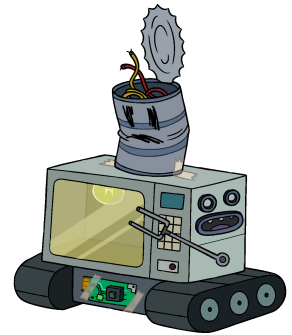AndyDufresne wrote:_sabotage_ wrote:Sorry, but the world is not UScentric. See, we have our own laws in Canada, and elsewhere. Wonder why the law isn't universal as is murder, stealing, rape?.
You are correct sabotage. Roadways outside of the USA do not contain cars. In fact, they aren't called roadways. Their strictly called walkways I think.


--Andy
Their (SIC) strictly called walkways. No, the laws outside of the US in the Wiki article don't mention cars. You are jaywalking regardless of whether or not cars are present.
Please work on your reading comprehension skills.
There are three distinct possibilities:
1. An action if done by one person doesn't doesn't harm others, but if done by all harms others.
2. An action if done by one person harms others, and if done by all harms others.
3. An action if done by one person doesn't harm others and if done by all doesn't harms others.
All three of these may be illegal, but only the first two are immoral. In many cases the first two may be legal, such as paying tax. If the taxes are being used to harm others, then it is immoral to pay, and illegal not to.
Since laws are decided by morality in general, such as the difference between first degree murder, second degree, justifiable homicide, these are matters of morality, we can say that laws may be moral. It doesn't mean they have to be.
Marijuana is a good case. Research has been done since prohibition and never shown that Marijuana is harmful, outside of the policies used to enforce its prohibition. That is, the laws aren't moral and in fact decrease morality.
Morals are universal, laws are arbitrary. When Hitler is in power, it is illegal to harbor a Jewish person, and when he is out, it is illegal to harbor a Nazi wanted for war crimes. Since legality is subjective and dependent on the morality of those enabled to enact law, it is not moral.
When you choose to continually say: we don't need morals, we have laws; you are saying that those empowered may at their whim decide what is best.
Similar to what endgame said in another thread: I will decide at the time.
If the general public became immoral, not interested in the harm that may come of an action, then this would mean absolute corruption. We would have no yardstick to measure right or wrong except state power and the ability to put yourself beyond it's influence. This has been the path the US is on.
The reason it's on this path is because atheists say that they aren't constrained by religion. OK, fine. What are they constrained by? Law. Law is arbitrary, so they are merely constrained by what laws they don't have the power to change. Or constrained by laws that may already be immoral.
Religious law didn't come about by accident and shouldn't be discarded without justification.
If we look at the new found definition of rape in the US we can see why this is. Rape is supposed to be forced sex. Our new definition is, without direct and exceedingly clear-cut consent, sex may be deemed rape.
Moral:
If one person did this, would it hurt others?
I certainly don't ask my wife for formal consent to start having sex when we are engaged in heavy foreplay. I would expect if she didn't want to engage in sex, she would (and does) make it clear. So, she has never been hurt by my lack of direct, clear-cut consent.
What if everyone did it?
Still the same issue. If a person feels pressured to have sex and still complies, why wouldn't they feel pressured to say yes? There is no difference. In fact, this new definition of rape makes rape arbitrary. Rape is no longer a question of morality but of legalese. Forced sex remains immoral, but *most acts of sex become illegal.
Since humans have been subject to the same forms of harm since we've come to exist: injury, death, enslavement, forced behavior, we shouldn't expect morality to change over time. It can be more clearly defined, but the essential aspect, harm and how we may be harmed, doesn't change.
We would therefore need an extremely compelling argument:
1. To change the laws;
2. To place someone or group beyond the laws;
3. To change the penalty for breaking the laws.
Morals are a key component of social justice, fairness and stability. Laws are not.
Now that I have educated you, I expect fewer dumb ass remarks.







































































































